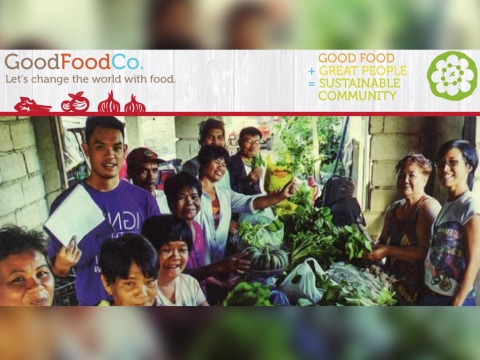“If we can connect socially-aware city dwellers with smallholder farmers in a re-localized food economy, we will make farming more sustainable, conserve and protect our soil resources and build the health of our communities” – GoodFoodCommunity
Having been to various organic farms in the country and listening to first-hand stories of organic agriculture (OA) practitioners, I have opted to shift to a “healthier” living for more than a year now. I tried juicing vegetables, incorporating fresh salads in every meal, and eating more vegetables than meat or rice. But the integral part of this diet is that these greens that I consume must be ORGANIC (as much as possible). Although there is enough supply of organic produce in supermarkets, I honestly think they are overpriced… so I looked for other alternatives.
Ever heard of getting a subscription for vegetables? …or picking up veggies in a bayong from a hub?
This has been my routine since I decided to become a shareholder at Good Food Community (GFC) – my supplier of organic vegetables. I started subscribing veggie packs from them since March 2014 and picked up our weekly basket of seasonal fresh organic produce from one of their community hub. I tried all three of the veggie packs they have – Bayong Pambahay, Salad Pack, and Juice Pack – but my favorite is the salad pack. The Bayong Pambahay consists of a colorful mix of 6-8 types of leafy and hearty vegetables such as carrots, cabbage, cucumber, yacoon, fennel, sayote, celery, kamote, sitaw, okra, ampalaya, ginger or turmeric, Chinese kangkong, Chinese or native petchay, spinach, mustasa, or kailaan. While the Salad Pack is approximately 500 grams of fresh salad greens and herbs like frillice, romaine lettuce, red romaine lettuce, green ice lettuce, arugula, parsley or mizuna. Lastly, the Juice Pack includes an assortment of detox, energy, and renewal juicing vegetables such as carrots, beets, cucumber, celery, upland spinach, and spinach amaranth.

These vegetables come from about 50 farmer-partners of GFC in Tarlac, Benguet, and Mountain Province and are shipped to Quezon City. These are then sorted into the prescribed volume per packs and dropped off at the various community hubs where subscribers such as me pick up the prepared baskets. Even so, every delivery is exciting because the basket’s contents are always “subject to change without prior notice” since the supply is based on farmers’ actual production on a weekly basis.
However, there’s a whole lot more to this than getting organic vegetables that would sustain my “healthier” living preference. I chose GFC essentially for their commitment to build a more caring community, for advancing Community Shared Agriculture (CSA). I first encountered this mechanism during our 2nd Knowledge Sharing Forum on Good Agricultural Practices through the e-Extension Program last September 2012. The CSA of GFC is somewhat very similar to the MarketMaker Program of the United States presented by Dr. Khin Mar Cho of Cornell University Cooperative Extension. The MarketMaker creates a link among farmers, traders, and consumers through an accessible online database that has an interactive mapping system, buy-and-sell forum, and demographic searches – utilizing the concept of online marketing. The big difference here is, the Good Food Community tailor-fitted a CSA model that works for smallholder farmers. They serve as the link between the farmers and the consumer, ensuring farmers a stable demand for their goods and facilitating the delivery of supplies directly to the consumers. Somehow, I believe it is a shorter and more effective system in our local setting, plus it does not require investing on infrastructure and systems development.
Another reason why I chose Good Food Community is that they are a social enterprise that brings fresh organic produce all the way to city communities here in Metro Manila (at a very reasonable price) which is very convenient for me since their nearest hub is just a stone’s throw away from our house.
Lastly, I chose GFC because they help me in my aspiration to create a change (no matter how small) in other people’s lives. Because by subscribing, I became a shareholder and I am a shareholder because I support farm operations and ensure farmers a stable demand for their produce. Knowing that I eat fresh organic vegetables everyday and that I am able to help farmers and reinforce sustainable food production because of this is, is more than enough to make me say that I can definitely help change the world with food. *wink*

